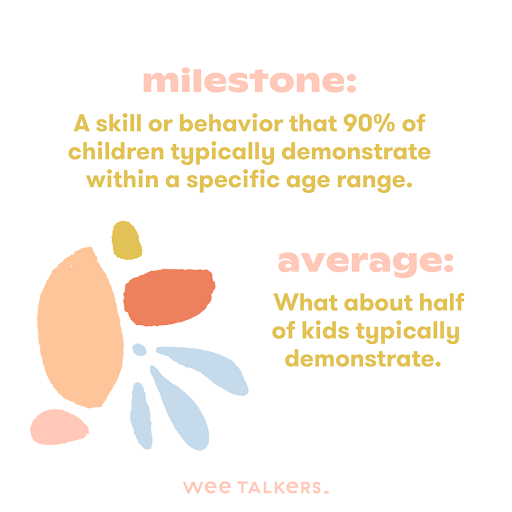Late Talkers: What To Do & When To Worry
Last Updated: August 28, 2024
If your child is talking less than others their age, you might be starting to worry. Are those kids ahead or is mine behind? Should I be concerned? Are they technically a late talker? Could this be a sign of a delay? Do they need speech therapy? Worrying if they’re okay and wondering what exactly caused their difficulty with talking can be a really heavy part of being a parent. If you’re in this now, we want you to know that you’re not alone, that your concerns are valid, and that there’s so much support available—for your child and for you.
As speech therapists, we want to use this post to teach you more about your child’s language development and what being a late talker really means, so you can feel confident in your understanding of where they’re at now, and what they might need next.
Do I Have A Late Talker?
First thing’s first, what is a late talker?
It’s important for you to know that there’s a lot more to language development than verbal communication alone. So late talkers are children who are developing typically in all or most other areas—even other speech and language-related areas—but just aren’t quite talking yet. This is different from a child with delays in understanding language as well as delays using language OR a global developmental delay, where typically, children are missing multiple developmental milestones.
According to the American Speech-Language-Hearing Association (ASHA), a late talker is a child who demonstrates late language emergence (LLE), which is defined as “a delay in language onset with no other diagnosed disabilities or developmental delays in other cognitive or motor domains. LLE is diagnosed when language development trajectories are below age expectations. Toddlers who exhibit LLE may also be referred to as "late talkers" or "late language learners."
“Children with LLE may have expressive language delays only, or they may have mixed expressive and receptive delays. Children with expressive delays show delayed vocabulary acquisition and often show delayed development of sentence structure and articulation. Children with mixed expressive and receptive language delays show delays in oral language production and in language comprehension.”
(In other words, if your child isn’t talking yet, but understands, points, uses gestures, and has some words, and is developing as you'd expect in other domains, they may be a late talker.)
Before we move on, let us reassure you that if you do have a late talker, you haven’t done anything wrong. And, there’s still so much that you and your child’s support circle can do to help them along. So instead of worrying, we want to encourage you to keep learning and seeking support from professionals, like you’re doing right now.
Related: Signs of Speech Problems in Toddlers
Permission To Stop Comparing (And Look At Milestones Instead!)
We’re pretty sure one of the main ways late talker-related worry creeps in is through playground comparisons. We see other toddlers saying more than ours, or putting words together into little toddler sentences. And instead of pausing to think about how all kids are different and on their own journeys, or thinking maybe those kids are just progressing through speech language development quickly, we all jump straight to thinking it’s our kids who are behind—or that we’ve done something wrong. It’s a really tough part of parenting, but it’s something we’re pretty sure we all experience.
As much as you can, avoid the comparison game between your kids and others. Just shut down the part of your brain that wants you to go there! Here are three facts-turned-mantras that can help you work through comparison anxiety when it comes up:
Every child is different
Development isn’t always perfectly linear
“Normal” is just a setting on the dishwasher
While another child might excel in language development where your late talker is a bit behind, we’re sure there are other facets of development that your late talker excels at! And remember, when your child excels at something, there are probably other parents comparing their little ones to yours. You’re so not alone!
Familiarize Yourself With Development Milestones
You’re WAY familiar with all the reasons why comparison doesn’t feel good as a parent. But we also want you to know that it doesn’t serve a real purpose for tracking, supporting, or encouraging speech and language development, either. So if you haven’t yet, full permission to let go of comparisons with other children for good.
As speech-language pathologists, we never compare one singular child’s development against another. Instead, we look at your child’s development against the research-backed, developmental milestones and averages. (A milestone is a skill that 90% of children tend to have down pat within a specific age range, and whereas an average is what about half of kids can typically do in that same age range.)
If you’re starting to worry about your late talker, download our speech and language milestones checklist. Then, look to see which skills your toddler already has, which ones they’re working on, and what you can expect them to do next. If you notice that they’re not quite meeting the milestones they should be, it might be time to seek support from a speech-language pathologist.
I Think I Have A Late Talker. When Should I Worry?
It’s hard not to worry when you have a late talker. But as much as possible, we recommend that you try not to worry too much. (Easier said than done, we know!) Instead, focus your energy on doing more of what you’re doing right now: getting informed, gaining insight from knowledgeable professionals, and seeking support. That’s the perfect first step and we promise, it’s the right thing for you to be doing at this time.
When To Get A Speech & Language Evaluation
As a parent, your concerns are valid. So if you’re worried or you have that gut feeling, know that there’s never really a bad time to seek out a speech and language evaluation. That said, if you’re worried your little one might be a late talker, the following signs would indicate that your little one might benefit from a speech/language evaluation:
Family History of Speech/Language Delays or Disorders
History of Chronic Ear Infections
Difficulty Understanding Language (E.g, Simple Directions, Familiar Vocabulary)
Decreased Play Skills (Not playing in the way you would expect)
Limited Number Of Consonant Sounds
Regressing In Vocabulary
Not Using Gestures
Do Late Talkers Ever Catch Up On Their Own?
Sometimes, yes. Research shows 70-80% of late talkers will catch up on their own, while 20-30% continue to struggle without professional support.
The trick is that we don’t know which kids will catch up on their own until they’ve done it! So while there is a chance that your late talking will catch up without support from a speech therapist, we don’t recommend waiting to find out. We’ve never met a family who regretted getting support early. In fact, it’s the opposite—families often tell us they wish they’d started sooner.
How To Support Your Late Talker
If you’re concerned about your child’s development, say something. Talk to your pediatrician or, if you’re in the US or Canada, refer yourself to early intervention services (free in most places). It’s never too early to get a speech and language evaluation if you’re concerned.
Remember, you know your child best, and your concerns as a parent are valid. So if your pediatrician tells you to “wait and see” but in your gut, you just know your child would benefit from support, reach out directly to a speech therapist! It’s SO helpful to have a skilled expert in your corner, who can lay eyes on your individual child and support you week-to-week. We promise, you won’t regret seeking support when you need it.
How Our Toddler Course Can Help
A lot of what we do with toddlers in speech therapy, is teach parents the strategies that we know help toddlers talk and communicate more. We created our TalkToddler course for this reason—after all YOU are with your child more than any speeh therapist could ever be. If you need extra guidance, this program will walk you through how to help at home!





